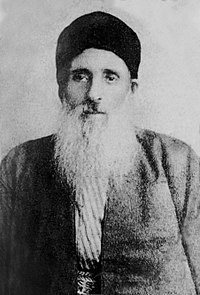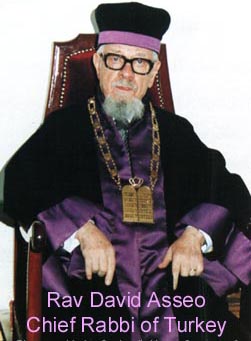Hakham Bashi
Hahambaşı ( Ottoman خخام باشی Chacham bashi ) is the Turkish title of the upper or the Chief Rabbi of Turkey, the Head of the 17,600 Jews in the country. The Chief Rabbi has its headquarters in Istanbul. Due to the history of the Ottoman Empire, the institution is regarded as one of the most important of its kind
History
The institution of Hahambaşı (the term is composed of hakham, Hebrew for example and bashi, Turkish for Main) was created was used in 1835 as the rabbi of Istanbul Abraham Levi Pasha of the Ottoman authorities, for the first Chief Rabbi of the Ottoman Empire, and so a similar position like the Greek and Armenian Patriarch attained. After the millet system, which was created for the control of religious minorities, was extended to the Jewish community, the Office of Hahambaşı had been created in order to obtain a similar administrative basis as in the Christian minorities. The fact that the institution of Hahambaşı goes back to the reign of Sultan Mehmed II, who had declared after the conquest of Constantinople in 1453 Opel Moses Capsali chief rabbi, the mythology is attributable. According to Bernard Lewis, there is no evidence that would have existed in the 15th or 16th century some kind of a Chief Rabbinate in the Ottoman Empire. In the current research, it is assumed that there is probably always some rabbis were in the larger cities, which occupied a prominent position towards the authorities. However, from a Chief Rabbinate for the entire Ottoman Empire can speak only from 1835.
Motivation for the creation of a new Chief Rabbi place around 1835 were the Ottoman reform efforts for minorities, after the loss of Greece ( 1832) were considered necessary, as well as the pressure of Great Britain, which pushed for an " emancipation of the Jews."
The goal was to rule the ethnically and culturally very different subjects as far as possible according to their own laws. Since religion was viewed as an important basis of the identity of the different communities, their religious leaders were also called ethnarchos. This is true except on the Hahambaşı on the Christian Ecumenical Patriarch of Constantinople to Opel, and especially to the Grand Mufti, the highest Islamic legal scholars in the Ottoman Empire, who even held the rank of a minister.
Due to the size and geographical location of the Empire, not only Palestine, the historic homeland of the Jews, but also more diaspora communities than any other country involved, the Hahambaşı was also compared with the exilarch, the leader of the Jews during the Babylonian exile and later Persian Empire.
The Hahambaşı had during the Ottoman Empire extensive legislative, and judicial authority over the members of his community and direct access to the Sultan. By imperial decree ( Berat ) were regulated the duties and rights of the Hahambaşı. It concerned mainly three points: first, religious authority and jurisdiction, secondly, the representation of the authorities and the collection of taxes, thirdly, the permission to read the Torah, which was synonymous with the right to establish synagogues. Inflamed at the new office within the Jewish communities of a clash between the traditionalists and the reform-oriented forces. The position of the Hahambaşı remained controversial about thirty years. Only with the appointment of respected rabbis United Yacob Avigdor and Yakir Gueron the Office of Hahambaşı could consolidate.
The Chief Rabbi of today's secular Turkish Republic also carry the title Hahambaşı.
List of Hahambaşı in the Ottoman Empire and the Turkish Republic since 1835
(according to Encyclopaedia Judaica )
List of important and major rabbis in Constantinople before 1835 Opel
(according to Chief Rabbis of the Ottoman Empire and Republic of Turkey )









